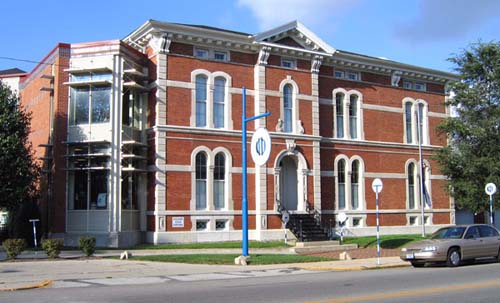
The Sheriff's residence of the old Jail now houses the Centerville and Center Township Public Library.
THE COUNTY-SEAT WAR IN WAYNE COUNTY
—A JAIL ATTACKED BY DISGUISED ARMED MEN
A telegram from Richmond, Ind., to the Cincinnati Times, dated Oct 29, gives some detail of the disturbance in Centreville on the morning of that day. The correspondent says:
“About 3 o’clock this morning the citizens were aroused from sleep by the violent and prolonged ringing of the Court-house bell, and, this failing to alarm the people, the fire-bells added their incessant clang. Hundreds of people went from the windows to the doors of their mansions, peering out into the starlight night, but, seeing no evidence of a conflagration, almost all returned to listen for an hour to the loud alarm bells. Those who dared the cold and went to the depot, found an engine and two cars chartered by the commissioners awaiting the gathering of a crowd to proceed to Centreville where exaggerated reports were told of the bombardment of the jail building by an infuriated mob, and of the killing and wounding of a party of Deputy Sheriffs, who had barricaded, themselves in the building, and had been fired upon with loaded cannon and every other conceivable weapon of war. About 100 persons, variously attired, boarded the train, and together with Sheriff Study, started for Centreville to quell the riot * * *
From the besieged party of Deputies we learn the following facts of the siege: At 10:30 o’clock Lew Samuels, Len Scott, William Alexander, Fred Piele, Frank Davenport, Doc Watson, and another were besieged in their quarters in the Sheriff’s residence by a crowd of masked and otherwise disguised persons, who demanded that the centre doors be at once opened. Upon the deputies refusing to obey the order the mob commenced swearing and threatening acts of greater violence. After an hour’s parley the spokesman of the mob gave the Deputies twenty minutes to surrender. This they did not do, when an old iron six-pounder, mounted on wooden wheels, was brought in front of the building and fired — probably a blank charge, as it did no execution. Lew Samuels, Len Scott, and another of the of the deputies escaped through a back window, and on foot fled to Richmond, when the alarm bells were rung to call out recruits. At 3:30 the mob, after more demands to surrender, brought the cannon to bear upon the front door and fired. The report of the ordnance was distinctly heard here, five miles distant. This time the gun was loaded with iron scraps, old nails, bolts, and other debris of a blacksmith shop. The effect was to entirely shatter the heavy door, through which breach the yelling mob hurled themselves; but Alexander, Peele, Watson, and Davenport had retreated into the jail in the rear, and again barricaded themselves in the iron cells. At the moment of the discharge of the cannon nearly 100 shots were fired from small arms from every direction, several balls passing in clean proximity to the brave boys guarding the county property with their lives. Now commenced another parley, the mob demanding that the jail door be opened or they would murder the defenders, only one of whom, Watson, urged a surrender, and even threatened to open the door, but the revolvers of the other three had a salutary effect upon his courage. The mob at last gave the deputies five minutes in which to surrender, or they would blow open the iron doors with the cannon now brought into the hall and leveled at the jail doors. The mob declared they would not injure those who would lay down their arms and submit to being searched for the jail keys. This indignity the deputies refused, but finally, being confronted by an armed mob of sixty men, with loaded cannon, they proposed to surrender, provided they were allowed to leave their fortress bearing their arms, and without search. These terms were agreed to and the heroic fellows marched out of their stronghold. The mob at once surrounded them, and marched to the edge of the village, where, with three cheers for the dastardly outrage, they disbanded, just as the train from Richmond, bearing recruits, steamed up to the little station-house, ten minutes too late for an account of bloodshed or a big foot-race. The deputies marched at double quick, four abreast, on to Richmond, but returned at once to join the reserve corps, who, after a long search, found the cannon, which a portion of the force brought back to this city in triumph, and dragging it through our muddy streets, placed it in the new Courthouse yard, where it now frowns threateningly.
From the County Commissioners we learn, upon their returning here, that
they have done everything in their power to satisfy the unreasonable demands
of the Centerville people, even proposing to remove only the jail-building
proper, and to leave the fine residence of the Sheriff for some charitable
institution to be founded there. Commissioner Wiggins has received anonymous
letters warning him to desist in his efforts to remove the jail or he
will he murdered. Many other prominent men are threatened with death unless
the jail is left where it don’t belong. The Commissioners are sending
wagons to Centerville this afternoon for the old material, and there will
probably be further trouble, and perhaps somebody hurt as an armed force
of deputies now hold possession of the property there, and others are
to reinforce them....”
New York Times
November 1, 1873

Some of the marks left by the 1873 altercation